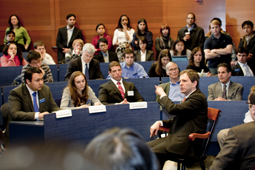Energy panelists look for better policy, profit mix
 Photo/Sharona Jacobs Photography
Photo/Sharona Jacobs PhotographyDavid Cash, under secretary for policy in the Massachusetts Office of Energy and Environmental Affairs, addresses Perlmutter Institute audience at the International Business School.
In a student-organized leadership roundtable, "Over the Horizon: Opportunities in Global Clean Energy Trade," business experts and Brandeis International Business School students exchanged ideas on how to promote clean energy in the 21st century. The forum, sponsored by the Perlmutter Institute for Global Business Leadership, explored the question: "What types of synergy between policies and business in the clean industry are needed to maximize profit, social and environmental benefits?"
The discussion included a diverse panel of experts within the industry including Michael L. Bernier, senior manager for Ernst and Young; David Cash, under secretary for policy, Massachusetts Office of Energy and Environmental Affairs; Paul Sellew, chief executive officer and founder of Harvest Power; and Minoru Takada, head of the Sustainable Energy Programme, United Nations Development Programme.
In the opening presentation by the student panel, Helena Cardenas MAief '11 came quickly to the point that "clean energy is highly dependent upon public policy" demonstrating market inefficiencies caused by asymmetries of policy and business practices. She and her fellow panelists concluded that demand creation is integral in solving the "last mile" inefficiencies that plague the industry.
Cash focused on Massachusetts' energy objectives and policy. He said extremely high local energy prices are a result of the states' location at "the end of the energy pipeline" and offered policy prescriptions to alleviate this situation. The top priority of his department is to "bring energy and the environment under one umbrella," in an attempt to align the interests of energy providers with the public interest. The focus, according to Cash, is on creating economic and job growth within Massachusetts, using business solutions to solve public problems.
Bernier explained some impediments to the clean energy industry, cautioning students to "be very careful of unintended consequences down the road" as they frame specific policy goals. In his view, market volatility and changing political environments lend uncertainty to long-term planning of these clean energy industries, requiring students to "design very specific systems to meet clean energy goals" because "decisions made today will still be around in 2030," regardless of their efficiency and effectiveness.
Switching gears, Sellew discussed his experience from the business side of the organics energy industry. Sellew emphasized organic waste as an "undervalued resource" that is "new and novel" as an energy source here in the United States, but commonplace in Europe. Likening his company, Harvest Power, to European organic energy producers, Sellew explained the win-win of bio-mimicry —anaerobic digesters —in creating "carbon negative processes" that produce both energy and nutrient rich soil.
He asserted that creation of a workable compost infrastructure in the US is feasible through a combination of public and private enterprises; what's needed, he said, is separation of food from other waste at the source and expanding supply chains.
Expanding the discussion to include global energy and environmental issues, Takada presented work and policy prescriptions from the United Nations Development Programme's Environment and Energy Group.
Takada emphasized the relationship between access to energy and quality of living among a population of three billion impoverished people. "We care about development, people and human rights," in almost entirely poor, developing nations, expressed Takada. Yet without deep infrastructure and business endeavors in these poor areas, "creative, bottom-up solutions" must be used to scale-up effective and efficient energy solutions throughout the world.
While the panelists covered a diverse range of domestic, international, business and governmental issues, one theme rang clear: Improvements to the clean energy industry are most effective when policy and practice mesh. The trick, they said, is for future business and public policy leaders to promote a confluence of public and private clean energy ventures that further the notion "there is green (money) in green."
Categories: Business, Science and Technology






